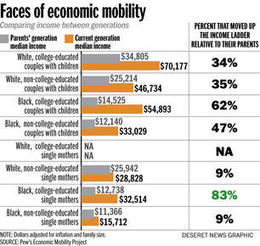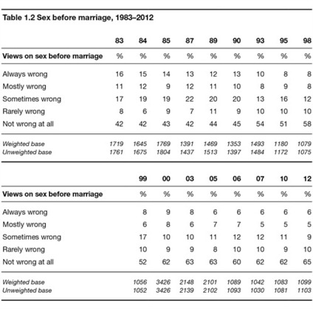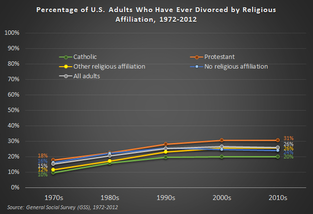From: Michael J. McManus <Mike@marriagesavers.org>
Date: Tue, Nov 5, 2013 at 4:25 PM
Subject: How To Cut the Divorce Rate in Half
Reform of No Fault Divorce – Family Research Council Panel Tomorrow
I will be participating tomorrow in a panel discussion at the Family Research Council on “Why Divorce Must Decline for America to Prosper.” It will begin at noon, and can b e seen on line. Here is a link to the FRC announcement about it:
: http://www.frc.org/eventregistration/devastation-why-divorce-must-decline-for-america-to-prosper
In my remarks, I will provide evidence that America’s divorce rate could be cut in half. In fact, I wrote a short book with the title, How To Cut America’s Divorce Rate in Half: A Strategy Every State Should Adopt.
Last year there were 1.2 million divorces in America compared to 2.2 million marriages, according to Census. In fact, there has been one divorce for every two marriages every year since 1975. We have become so inured to this 50% divorce rate, that few realize the U.S. divorce rate is triple that of Britain or France. After 5 years of marriage 23% of Americans have divorced, but only 8% of the British or French. Why? If a British wife wants a divorce, but her husband is opposed, they have to wait 5 years to get divorced. In France, the delay is 6 years. Five or six years allows a lot of time for reconciliation!
By contrast, 25 states have a zero waiting period or only 20-60 days. No wonder the U.S. divorce rate is off the charts. These states have laws that actually encourage divorce.
Only two states – Illinois and Pennsylvania – allow a two-year waiting period if a divorce is contested. Result: Their divorce rates are about half that of 10 “Hot Head” states with a zero wailing period: Wyoming, Idaho, Kentucky, Mississippi, Florida, Tennessee, New Mexico, New Hampshire, Nevada and Oregon.
Therefore, one obvious reform of No Fault Divorce is to require at least a year before a divorce is granted – and two years, if the divorce is contested. That step alone could cut the divorce rate in half of Hot Head States with zero waiting. Another step that could help enormously is to require couples with children to take classes on the impact of divorce on children. An unhappy spouse with children tends to rationalize: “Kids are resilient. They will bounce back.”
No, they won’t. I will quote Michael Reagan, the adopted son of Ronald Reagan and Jane Wyman, who wrote of his parents’ divorce:
“Divorce is where two adults take everything that matters to a
child – the child’s home, family, security, and sense of being loved
and protected – and they smash it all up, leave it in ruins on the
floor, then walk out and leave the child to clean up the mess.”
Another answer is to require divorcing couples to take classes during the year’s delay to improve their skills of communication and conflict resolution. One reason many divorce is that they do not know how to argue respectfully. Fortunately, that can be taught.
The Parental Divorce Reduction Act
Beverly Willett, the co-founder of the Coalition Divorce Reform, will outline a bill, the Parental Divorce Reduction Act, which could be adopted by any state. It contains three important elements:
· A requirement that couples with children take a four-hour course on the impact of divorce on children before a divorce is filed. Hopefully, many couples would decide to improve their marriage rather than walk away from each other and their kids. This proposal was first proposed by Dr. Bill Doherty of the Un. of Minnesota and former Georgia Chief Justice Leah Ward Sears, in a report, Second Chances, published by the Institute for Amerian Values.
· A minimum waiting “Period of Reflection and Reconciliation,” of 8 months during which couples could continue living under the same roof, if desired. All states with waiting periods force the couple to separate - which only encourages dating and divorce.
· The taking of a course to improve couple communication and skills to resolve conflict during the Period of Reflection and Reconciliation.
Three states have been giving these proposals serious consideration, as I reported in the attached column published by the AFA Journal in September:
1. Georgia, a state with only a 30-day waiting period, which would be stretched to a year, if the state passed a brilliantly named bill, the “Hope for Family Life Act,” that has been advanced by a divorced dad, Greg Griffin (770 310-7190). He has personally met with Gov. Nathan Deal and with 21 of the state’s 56 senators.
2. Texas held two hearings this year, prodded by Jonathan Saenz, Director of Texas Values, the Family Policy Council for Texas (JSaenz@TXValues.org). That bill would increase the waiting period from 60 days to 6 months.
3. North Carolina now requires one-year delay. A proposed Healthy Marriage Act would double that to two years.
One criticism I will make is that America’s religious leaders seem utterly disinterested in the nation’s divorce rate. I do not know of a single leader who has advocated any reform of No Fault Divorce – Catholic or Protestant.
Please call me with any questions you may have, or tune in tomorrow, which can be watched on line at FRC.org.
Mike McManus is President of Marriage Savers.
He also writes a nationally syndicated newspaper column,
Ethics & Religion.
Potomac, MD 20854



















































